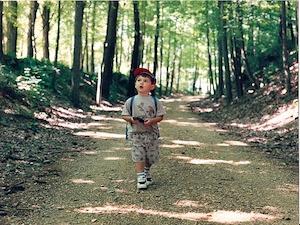Prescribing nature for children
Photo of a child in the woods. (Image by Flickr user Jonf728 (cc:by-nd))
This story was originally covered by PRI’s Living on Earth. For more, listen to the audio above.
When nature competes with Facebook, iPads and video games, it can be hard to convince children to get outside. Dr. Charles Owyang believes he’s found a way: by writing them prescriptions. “It’s a phenomenal way to really get kids back out to nature,” Dr. Owyang told PRI’s Living on Earth, “and it seems like, you know, it’s something that we can really get traction on and kids and families are responding.”
Writing out the prescription “gives them something to take out of the office that reminds them to get back out and to play,” Owyang says. The idea is part of the National Environmental Education Foundation’s Children & Nature Initiative, a government program that tries to connect children with nature for health benefits.
Owyang and other doctors also try to motivate children with visual handouts and activities, “like photographing nature, learning how to identify birds on the bay, doing GPS scavenger hunts for different treasures at the nature reserve…so, they’re actually a lot of fun.” The program also has rewards, like binoculars, plush toys and tote bags to motivate kids further.
Once kids get outside, the health benefits come naturally. Owyang cites studies that show “for every hour that they’re out, they probably have an extra 27 minutes of fairly vigorous exercise.” Studies have found that “ADD and ADHD symptoms can be reduced and that the nature, and being outdoors and being near green areas, can really decrease impulsivity, and also increase your attention span.”
Researchers have even been looking into whether virtual nature could work, too. Owyang told Living on Earth:
There have been some studies where they have put people on a treadmill and made them exercise, and they showed them green scenes, where they were in a rural, pleasant environment – and they found that there was a significant improvement in the positive effect of their moods, so it does definitely help mood and blood pressure.
Right now, researchers estimate that a third of the population under 20 is overweight or obese. That puts these kids at risk for diabetes, heart disease, and asthma. In fact, this could be the first generation of children with a lower life expectancy than their parents. Dr. Owyang hopes that a simple walk in the woods could help turn the trend around.
———————————————————————————————
Hosted by Steve Curwood, “Living on Earth” is an award-winning environmental news program that delves into the leading issues affecting the world we inhabit. More about “Living on Earth.”
